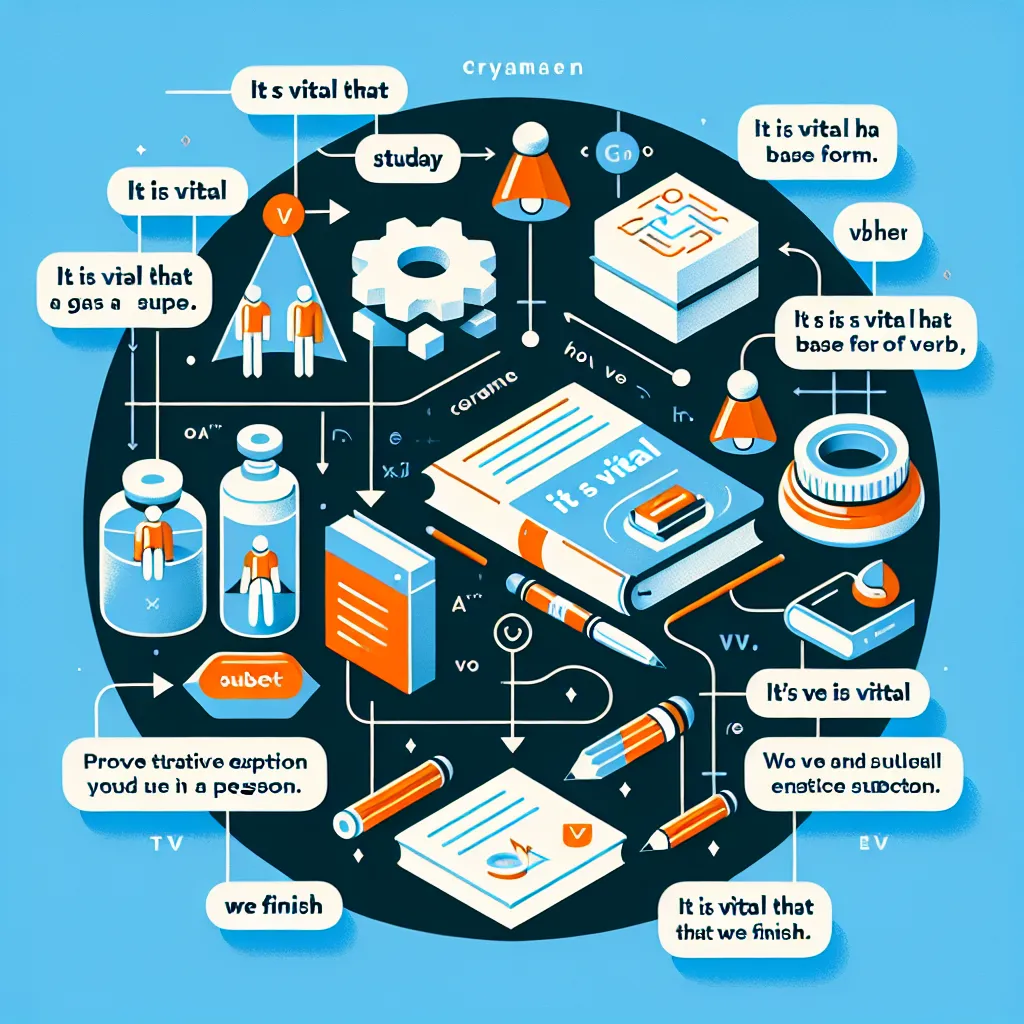The “It is vital that + subjunctive” structure is a powerful tool for expressing importance and necessity in English. This grammatical construction frequently appears in IELTS exams, particularly in the Writing and Speaking sections. Mastering its usage can significantly enhance your language proficiency and boost your IELTS score. Let’s dive into the intricacies of this structure and explore how to apply it effectively in your IELTS preparation.
Nội dung bài viết
- Understanding the “It is vital that + subjunctive” Structure
- Formula and Grammar Rules
- Applying the Structure in IELTS Writing
- Example 1: Education Essay
- Example 2: Environmental Essay
- Enhancing Your IELTS Speaking Performance
- Example 3: Speaking Part 3
- Comparing Usage for Different IELTS Band Scores
- Band 6 Example:
- Band 7 Example:
- Band 8-9 Example:
- Common Mistakes to Avoid
- Conclusion
Understanding the “It is vital that + subjunctive” Structure
The “It is vital that + subjunctive” structure is used to emphasize the critical nature of an action or situation. It consists of two main parts:
- “It is vital that” – This introduces the importance of the following statement.
- Subjunctive clause – This expresses the action or situation that is deemed crucial.
Formula and Grammar Rules
Formula: It is vital that + subject + base form of the verb
The subjunctive mood uses the base form of the verb regardless of the subject. This means that even with third-person singular subjects, we do not add -s to the verb.
Examples:
- It is vital that he attend the meeting. (Not “attends”)
- It is vital that she submit her application on time. (Not “submits”)
- It is vital that the government take action on climate change. (Not “takes”)
 Vital subjunctive formula
Vital subjunctive formula
Applying the Structure in IELTS Writing
In IELTS Writing Task 2, using the “It is vital that + subjunctive” structure can help you express your ideas more forcefully and demonstrate a high level of grammar proficiency.
Example 1: Education Essay
Prompt: Some people believe that children should be taught how to grow and cook food in schools. Do you agree or disagree?
Sample paragraph:
While schools already have a packed curriculum, it is vital that students learn practical life skills. In this context, it is vital that educational institutions incorporate gardening and cooking classes into their programs. These skills not only promote self-sufficiency but also foster a deeper understanding of nutrition and environmental sustainability. Moreover, it is vital that children develop a connection with their food sources, as this awareness can lead to healthier eating habits and a greater appreciation for the environment.
Example 2: Environmental Essay
Prompt: What can individuals do to help protect the environment?
Sample paragraph:
In the face of growing environmental challenges, it is vital that every individual take responsibility for their actions. Firstly, it is vital that people reduce their carbon footprint by opting for public transportation or carpooling whenever possible. Additionally, it is vital that consumers make informed choices, selecting products with minimal packaging and supporting companies with strong environmental policies. Lastly, it is vital that communities come together to implement local initiatives such as neighborhood clean-ups and tree-planting projects.
Enhancing Your IELTS Speaking Performance
The “It is vital that + subjunctive” structure can also be effectively used in the IELTS Speaking test to express strong opinions and demonstrate advanced language skills.
Example 3: Speaking Part 3
Question: What role should governments play in environmental protection?
Sample answer:
I believe governments have a crucial role in environmental protection. It is vital that they enact and enforce strict regulations to limit pollution and protect natural resources. Additionally, it is vital that governments invest in renewable energy sources and provide incentives for businesses and individuals to adopt eco-friendly practices. Furthermore, it is vital that they lead by example, implementing green policies in all government operations and public projects.
Comparing Usage for Different IELTS Band Scores
To achieve a higher band score in IELTS, it’s important to use complex grammatical structures accurately and appropriately. Let’s compare how the “It is vital that + subjunctive” structure might be used at different proficiency levels:
Band 6 Example:
“It is important for governments to make laws about the environment.”
Band 7 Example:
“It is vital that governments create and enforce environmental legislation.”
Band 8-9 Example:
“It is vital that governments not only enact comprehensive environmental legislation but also rigorously enforce these laws to ensure the preservation of our planet’s ecosystems for future generations.”
The higher band score examples demonstrate more sophisticated vocabulary, complex sentence structures, and a more nuanced understanding of the topic.
Common Mistakes to Avoid
When using the “It is vital that + subjunctive” structure, IELTS candidates often make the following errors:
-
Adding -s to third-person singular verbs:
- Incorrect: It is vital that he attends the meeting.
- Correct: It is vital that he attend the meeting.
-
Using the past tense instead of the base form:
- Incorrect: It is vital that she submitted her application on time.
- Correct: It is vital that she submit her application on time.
-
Inserting “to” before the verb:
- Incorrect: It is vital that we to conserve water.
- Correct: It is vital that we conserve water.
-
Overusing the structure, which can make your language sound repetitive:
- Instead of using “It is vital that” multiple times, vary your language with synonymous expressions like “It is crucial that,” “It is essential that,” or “It is imperative that.”
Conclusion
Mastering the “It is vital that + subjunctive” structure can significantly enhance your performance in the IELTS exam. By incorporating this construction into your writing and speaking, you demonstrate a high level of grammatical proficiency and the ability to express ideas with emphasis and urgency. Remember to practice using this structure in various contexts and to review your work carefully to avoid common errors. As you prepare for your IELTS exam, consider exploring related topics such as cultural impacts of language preservation and the role of entrepreneurship in economic growth to broaden your vocabulary and deepen your understanding of complex issues that may appear in the test.


